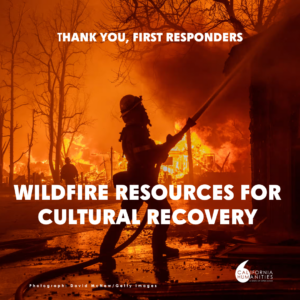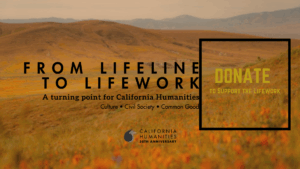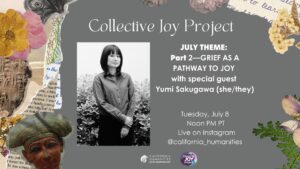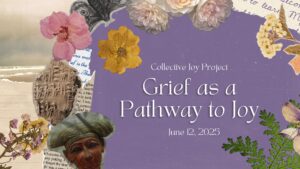Projects Supported by the Humanities for All Project Grant
January 5, 2022
For Immediate Release
Media Contact: Cherie Hill, Communications Manager, chill@calhum.org
Image / Courtesy of (re)Location
(Oakland, CA) —California Humanities is proud to announce its latest Humanities for All Project Grant awards totaling $259K to 11 nonprofit organizations and public agencies from Northern, Central, and Southern California. Over the next two years, these grants will support ambitious and innovative programs that will use the humanities to provide insight into a wide range of interesting subjects, including the role Black people have played in our state’s maritime history, similarities and differences between modern scientific and traditional indigenous perspectives on water and its uses, and how sharing stories helps build more inclusive communities.
Projects will take many forms, including interpretive exhibits (physical and digital), performances and discussions, lectures, workshops and demonstrations, film screenings, walking tours, and other activities embedded in community celebrations or festivals. All will aim to promote intercultural, and intergeneration understanding and reach new, underserved, and established audiences. In addition, through engaging activities accessible to people of all ages, abilities, and backgrounds, several projects will focus on involving youth in humanities-based learning and knowledge production.
We are delighted to award such a diverse round of Humanities for All Project Grants,” remarks President and CEO Julie Fry. “This year, we are thrilled that due to support from the National Endowment for the Humanities and the State of California, the average amount of awards increased from $20k to $25k, allowing grantees to expand their projects.”
The California Humanities’ Project Grant program, a branch of our Humanities for All competitive grant program, provides funding twice a year for public humanities projects of up to two years duration from the award date. Launched in 2016, the program has made 128 awards, totaling over $2M. Learn more about the Humanities for All Grant Program here.
Projects Awarded Summer 2022
Note: In this round of Humanities for All Project Grant awards, California Humanities designated specific funding for the area of Youth Voices. These projects involve teens as primary program participants or audiences and address topics or subjects of interest to them (denoted by “*”).
We Are Home
Delivering Innovation in Supportive Housing, San Francisco
Project Director: Mattie Loyce
“We Are Home” is a reflective and educational project that explores what home means to San Francisco residents, centering on people who have experienced homelessness in the Tenderloin neighborhood. Through a series of workshops and discussions, residents of the Tenderloin community, including DISH supportive housing residents, will craft a community quilt to share their thoughts and ideas about the meaning of home. In addition, a series of connected humanities-based events, including public round table discussions, audio and written recorded participant interviews, and a culminating exhibition of the collective work, will engage the broader San Francisco community and build bridges between communities of varying socioeconomic backgrounds. Through this project, the greater San Francisco community will better understand what home means for people who have experienced homelessness and why having a safe place to call home is essential to everyone.
Black Mariners of the Black Pacific: Reimagining Race, Migration, and Diaspora*
California Institute for Rural Studies Inc, Santa Cruz
Project Director: Caroline Collins
Black Mariners of the Black Pacific: Reimagining Race, Migration, and Diaspora examines 16th – mid-20th century maritime practices of people of African descent including whalers, commercial mariners, fishers, explorers, soldiers, and sailors who settled along the Pacific Coast of what is now the United States. This new public humanities project will employ formats including a traveling exhibit, small vessel build, and short documentary film in the service of investigating a less explored oceanography—the Pacific Ocean—to extend our understanding of the origins of Black people in America and the essential nature of the roles they played in the maritime enterprise and American genesis. Target participants of the boat build workshop include Black and Indigenous (including Black Indigenous) youth and university students. Anticipated program audiences are African American and Indigenous individuals and communities, interested residents within the geographic areas of inquiry, students and educators, maritime enthusiasts, and military personnel. Project goals include inviting participants and audiences alike to reimagine Black folks’ relationships to water and watercraft beyond the trans-Atlantic slave ship and to engender a recognition that Black people not only existed in the Pacific region but served as integral actors in the development of the Pacific economy and society.
The Cultural Work of Poetry: A Reading, Writing, and Community Discussion Series in San Jose, CA
San Jose State University Research Foundation, San Jose
Project Director: Jonathan Gomez
In partnership with the San José Public Library and the Culture Counts Reading Series (CCRS) at San José State University, this project will offer bi-weekly poetry reading, writing, and discussion workshops focused on work by featured poets in San José. The workshops will be facilitated by Dr. Jonathan D. Gomez, Assistant Professor of Chicanx Studies at San José State University, and a group of university students and community members from the CCRS, using a story circle pedagogy. This “testimonial” approach will encourage each participant to draw upon poetry and discussion as a launching ground to write poems about their own life experiences. In addition, project organizers aim to encourage participants to listen and learn from each other, and to practice a form of poetry making in a community that documents, describes, appreciates, and articulates their needs, hopes, and dreams for the world they want to live in.
Oral History from the Heart of California Gold Country*
Manzanita Writers Press, San Andreas
Project Director: Monika Rose
Manzanita Writers Press will create” Oral History from the Heart of California Gold Country,” a multiyear, multifaceted project to collect, preserve, and share family and community stories of the region. The project will connect local high school and college students with elders from many cultural backgrounds, including winemakers, ranchers, miners, and the Miwok people who have lived in the area for 16,000 years. The interviews will enable elders and youth to share their skills and knowledge and learn from one another, whether about using 21st-century technology or recording family and communal stories and histories that might overwise be lost. A publication and a series of readings and other events will ensure these stories are shared widely. Supporting partners include regional media, libraries, museums, Native American groups, businesses and associations, social organizations, and schools.
Transborder: Bracero History from Mexico to California
The Museum of Art and History at the McPherson Center, Santa Cruz
Project Director: Marla Novo
A new interactive mobile installation featuring a new work by transnational sculptor Daniel Ruanova will serve as a jumping-off point for dialog, story-sharing, and educational activities about farmworker histories in Santa Cruz County. Incorporating poster-sized reproductions of 1950s-era photographs of Bracero Program agricultural workers, audio recordings of interviews with Braceros and their descendants, and other historical material, the work will visit farmers’ markets during the MAH’s inaugural CommonGround festival, followed by an exhibition at the museum. Designed to engage local Latinx and farmworker communities, the project will also draw residents and guests from diverse cultural and socioeconomic backgrounds in a series of interactive, collaborative programs and events, including a panel discussion, artist/scholar talk, teen story-sharing, and meet-and-greet, film screening, book club, community/collaborator series, and a Family Day celebration. The project aims to increase knowledge and appreciation of Bracero’s history legacy among workers and their descendants and within the larger community, foster interpersonal connections between people from diverse backgrounds, and increase participation in museum programming by Latinx community members.
Imagining Indigenous Cinema: New Voices, New Visions
UCLA Film & Television Archive, Los Angeles
Project Director: May Hong HaDuong
A six-night in-person and live-streamed film series, “Imagining Indigenous Cinema: New Voices, New Visions,” and related public programs will provide humanities-focused programming for the greater Los Angeles region (and via live streaming across the state and the country). These programs will center on the experiences of Native filmmakers and their communities and engage Indigenous and general audiences in timely discussions about the issues and concerns inspiring Native artists. The program will focus on 12-18 short-form, mid-length, and feature-length works produced since 2014 by Native filmmakers that exemplify innovative approaches to cinematic visual and narrative forms. In addition, screenings, panel discussions, conversations with filmmakers, and other community engagement events will be held at two locations in Los Angeles: the Billy Wilder Theater on UCLA’s campus in Westwood and at a new theater in the Eagle Rock neighborhood June 2023.
Regeneration: Black Cinema 1898-1971 film screenings, public programming, and symposium
Academy Foundation, on behalf of the Academy Museum of Motion Pictures, Beverly Hills
Project Director: Dawn Mori
The recently inaugurated Academy Museum of Motion Pictures will present its second temporary exhibition, Regeneration: Black Cinema 1898-1971, a research-driven, in-depth look at Black participation in American filmmaking, opening in August 2022. This ambitious exhibition explores the visual culture of Black cinema in its manifold expressions, from its early days at the beginning of the 20th century to the civil rights movement of the 1960s, highlighting the work of independent African American filmmakers and its relationship with other visual artists. The exhibit will accompany screenings of recently restored “race films” and other related titles and a full slate of public programming. Regeneration is co-organized by Doris Berger, vice president of curatorial affairs, Academy Museum, and Rhea L. Combs, director of curatorial affairs, National Portrait Gallery. The project aims to redefine U.S. film history by elevating this underrepresented aspect of artistic production and presenting a more inclusive story about American film history.
Sonoma History for All
Sonoma Community Center, Sonoma
Project Director: Charlotte Hajer
Many peoples have played a role in Sonoma Valley’s history, but only a few strands of these multiple histories have found their way into the dominant narrative about the community. The Sonoma History For All project will engage the area’s diverse communities by reviving and exploring parts of the more extensive collective history that have been mainly obscured or omitted from teaching history in schools and museums. Through a series of interactive humanities-driven events – including a traveling exhibit, a performance series, and a collaborative mural project – the project will create a more inclusive local history that fully reflects the diversity which has always characterized this region. Project goals are to a) show that local history and culture are living things, collectively created and recreated by all members of our community; b) reveal how power dynamics and structural inequalities shape our perspective on the past and present; and c) come together and build community-based in the understanding that people from all walks of life, all ethnicities, and all language backgrounds, are at home in our shared past, present, and future.
(re)Location: The Lao/Korean Acculturation Project
Loyola Marymount University, Los Angeles
Project Director: Joyce Green
(re)Location explores Korean and Lao immigrants’ and refugees’ immigration and acculturation experiences in California through an interactive virtual exhibition and related physical exhibits and public programs. The project will shed light on the experiences of first-generation immigrants from these communities to (1) provide an entryway for younger generations of Korean and Lao Americans to a better understanding of their history while (2) creating an opportunity for the public to explore cross-cultural similarities and differences between the two communities. Guests from the Lao and Korean communities will participate in a panel discussion and public storytelling event to explore the themes in the exhibition and contribute to the store of knowledge the project is building. Through access provided by web technology, the broader California public will be invited to explore a library of first-hand stories and a gallery of artwork created by these immigrants, as well as to participate in educational, humanities-based activities appropriate for all ages. Visitors will have the opportunity to consider themes and topics that will inform the development of the exhibit and programs concerning their own identities and life experiences.
Rancho San Pedro Community Conversations Project*
Cornerstone Theater Company Inc, Los Angeles
Project Director: Bruce A. Lemon Jr.
Working with Humanities Advisor Angela Romero, founder of the San Pedro Heritage Museum, the Housing Authority of the City of Los Angeles, and the One San Pedro Collaborative, Cornerstone Theater Company will host a series of community conversations in Rancho San Pedro about the redevelopment of the historic public housing project. Employing Cornerstone’s signature Story Circles methodology, these conversations will bring together teens and elders from Rancho San Pedro to reflect on its present, learn about its past, and envision its future. The project will culminate in in-person and online public presentations and performances that will engage residents and the broader community of San Pedro and greater Los Angeles. The project’s goal is to create a “people’s history” of Rancho San Pedro that will increase awareness and appreciation for the history and vitality of this unique community.
Water Is Life
Mt. Shasta Museum Association Inc, Mount Shasta
Project Director: Rosemary Romero
Water Is Life – Past, Present, and Future is a multifaceted three-year project to facilitate an open dialogue about the relationship between people and water in Siskiyou County. Informed by extensive research, the project will use videos, interactive opportunities, and story maps to develop a physical exhibit and an online repository of materials that will make scientific, historical, and traditional knowledge about water available to community members and classrooms throughout the region. Presentations and community storytelling events will allow local partners, including tribal members, conservation practitioners, and scientists, to share their experiences working on water issues impacting the region. In this culminating phase of the project, the museum will pose a series of questions for the public to consider — is water a commodity to be exploited? do living systems have the same rights as people? — to encourage the community to make thoughtful and informed decisions about using this precious resource.
About California Humanities:
California Humanities, a nonprofit partner of the National Endowment for the Humanities, promotes the humanities—focused on ideas, conversation and learning—as relevant, meaningful ways to understand the human condition and connect people to each other in order to help strengthen California. California Humanities has provided grants and programs across the state since 1975. To learn more, visit calhum.org, or like and follow on Facebook, Twitter, and Instagram.
###





